2018年人教版新目标英语八年级下册全册精美导学案
新目标八年级英语下册全册导学案

新目标八年级英语下册全册导学案Unit 1 What’s the matter(A 1a-2d)学习目标:1.我要会用本课所学四会单词短语;2.阅读理解对话、短文并能复述,能用所学词汇、句型进行情景口头表达和书面表达;2我能使用should及shouldn’t对不同健康问题给出有针对性的合理建议;3. 我要提升听、说能力。
重点,难点:1.学会表达身体的各种不适;2. 识记对于不同健康问题的针对性建议的词汇;灵活给出建议;3.使用英语与同学灵活、自由、更深层次地谈论身体健康的话题。
独学准备:1.独学1a-2d中的单词及短语2.自读对话2d两次,把握大意,划出不懂之处并自己查字典解决课堂结构导学流程独立思考个体探究分享交流合作探究展示提升启发探究随堂笔记独学指导内容、学法、时间互动策略内容、形式、时间展示方案内容、方式、时间重点摘记、成果记录、规律总结Step1Warming-up1生齐读语言目标。
2.展示新词汇2.Free talk浏览Page1上1a部分,借助单词表完成1a。
v-ersa 用1a的词汇创编对话Listen-ing听录音,完成1b-2bUa2a and 2b. and make a conversation内容:Step1Warming-up学法:1.借助词典、电脑录音磁带等工具读准并理解本节课新词汇。
2.尝试默写新词汇。
胃痛 ___;脚____脖子_____喉______躺_____伤到自己了______肚子痛______;喉咙痛 _____牙疼_______怎么了_______患感冒______;咳嗽_____;量体温_______休息_______发烧________内容:Step2 Free talk学法:朗读背诵A内容,达到复习巩固的目的,为free talk 做铺垫。
内容:Step4 Listening学法:浏览1b-2b的听力要求,尤其是2a的图片,弄清要听的关键信息,为课堂听力做准备。
人教版八年级下学期英语全册导学案(81页)
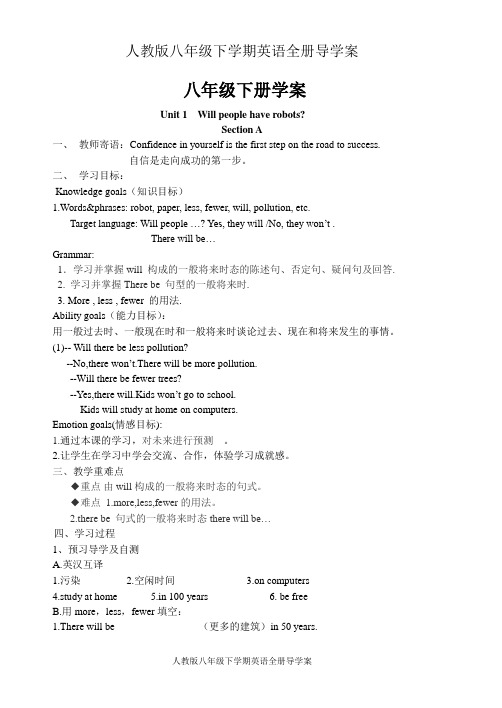
八年级下册学案Unit 1 Will people have robots?Section A一、教师寄语:Confidence in yourself is the first step on the road to success.自信是走向成功的第一步。
二、学习目标:Knowledge goals(知识目标)1.Words&phrases: robot, paper, less, fewer, will, pollution, etc.Target language: Will peopl e …? Yes, they will /No, they won’t .There will be…Grammar:1.学习并掌握will 构成的一般将来时态的陈述句、否定句、疑问句及回答.2. 学习并掌握There be 句型的一般将来时.3. More , less , fewer 的用法.Ability goals(能力目标):用一般过去时、一般现在时和一般将来时谈论过去、现在和将来发生的事情。
(1)-- Will there be less pollution?--No,there won’t.There will be more pollution.--Will there be fewer trees?--Yes,there will.Kids won’t go to school.Kids will study at home on computers.Emotion goals(情感目标):1.通过本课的学习,对未来进行预测。
2.让学生在学习中学会交流、合作,体验学习成就感。
三、教学重难点◆重点由will构成的一般将来时态的句式。
◆难点1.more,less,fewer的用法。
2.there be 句式的一般将来时态there will be…四、学习过程1、预习导学及自测A.英汉互译1.污染_________2.空闲时间______________3.on computers___________4.study at home______5.in 100 years____________6. be free_________B.用more,less,fewer填空:1.There will be ________________(更多的建筑)in 50 years.2.The students will have _______________(更少的家庭作业)to do.3.There will be ________________(更少的污染)here.4.Kids will have ________________(更少的计算机)in their classroom.5.There will be ________________(更多的图书馆)in this city.6.There will be ________________(更少的树)in the park.2、语法小结:一般将来时1)一般将来时由“助动词will+动词原形”构成,表示将来某个时间要发生的动作或存在的状态,常与表示将来的时间状语连用,如:tomorrow,next week,next year,in the future等。
新人教版英语八年级下册导学案全册
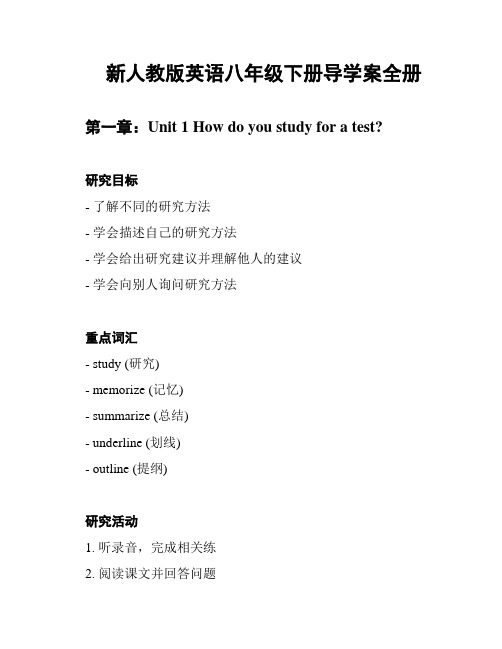
新人教版英语八年级下册导学案全册第一章:Unit 1 How do you study for a test?研究目标- 了解不同的研究方法- 学会描述自己的研究方法- 学会给出研究建议并理解他人的建议- 学会向别人询问研究方法重点词汇- study (研究)- memorize (记忆)- summarize (总结)- underline (划线)- outline (提纲)研究活动1. 听录音,完成相关练2. 阅读课文并回答问题3. 观看视频,了解不同的研究方法4. 小组讨论:描述自己的研究方法并给予建议5. 打开研究社区网站,询问他人研究方法拓展活动- 编写一篇短文介绍自己最有效的研究方法,并分享给同学们。
第二章:Unit 2 I used to be afraid of the dark.研究目标- 理解和使用used to的用法- 描述过去和现在的变化- 研究如何克服恐惧并充满勇气- 学会给予鼓励和支持重点词汇- used to (过去常常)- frightened (害怕的)- courage (勇气)- encourage (鼓励)研究活动1. 阅读课文,了解主人公的变化2. 讨论在生活中的变化和克服恐惧的经历3. 观看鼓励和支持的视频4. 小组活动:给予同组成员鼓励和支持5. 与语伴进行练,描述自己的变化和克服恐惧的经历拓展活动- 编写一篇故事,描述一个人如何克服恐惧并变得勇敢,并与同学们分享。
(以下章节内容省略)总结本册教材主要围绕研究方法和个人成长展开。
通过研究不同的研究方法和分享个人经验,学生可以提高研究效果并培养勇气与自信。
同时,通过鼓励和支持他人,学生也能积极参与集体活动。
对于学生们来说,在实践中运用所学知识,并与他人互动,是提高英语能力和培养社交技巧的重要途径。
希望同学们能够积极参与课堂活动,享受研究的乐趣,不断提升自我。
*以上为大致导学案内容,具体根据教材内容进行调整与完善。
模式1:人教版八年级下学期英语全册导学案(155页)
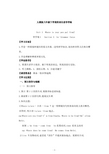
人教版八年级下学期英语全册导学案Unit 1 Where is your pen pal from?导学案1 Section A 1a--Grammar focus【学习目标】1.学会一些国家和城市的英文名称,:会用所学知识,询问和回答人们来自哪里。
2.学会理解和尊重异国文化.【学法指导】1、联系生活学习英语。
敢于用英语表达,用英语进行交际。
2、听力策略:A. 放松心情。
B. 注意关键字【课前准备】准备一张世界地图.【学习过程】一、预习指导与检测(一)预习指导1.预习第1-2页的生词,根据音标会读知意.2.朗读第1-2页的句型,能英汉互译.3.知识点拨:1)Where is/are + 主语 + from ?这一特殊疑问句用来询问某人来自哪里,回答时,用主语+is/are +from+地点。
eg:Where are you from? I’m from Chaohu. Where is he from? He’sfromHefei.拓展:be from = come from be是系动词,come 是实义动词eg: Where does he come from? He comes from Hefei.2)live 不及物动词,意思是“居住”不能直接加地点,需要有介词.eg: ----- Where does she live? ------She lives in Paris.3)pen pal =pen friend 笔友4)China 中国 Chinese 中国人 Japan 日本 Japanese 日本人eg:We are all Chinese. The three girl are Australians. (二)预习检测1.你知道这些国家和地区的英文名称吗?(1)中国_______(2) 加拿大________ (3)法国________(4)英国_________(5)澳大利亚______(6) 美国_______(7)新加坡______ (8)悉尼________(9) 巴黎_______(10)纽约________(11)多伦多_______(12)东京_________二、课堂互动探究1. 小组活动:1) 共同总结本节课的重点单词及短语,然后互相提问。
2017-2018新目标英语八年级下册全册精美导学案
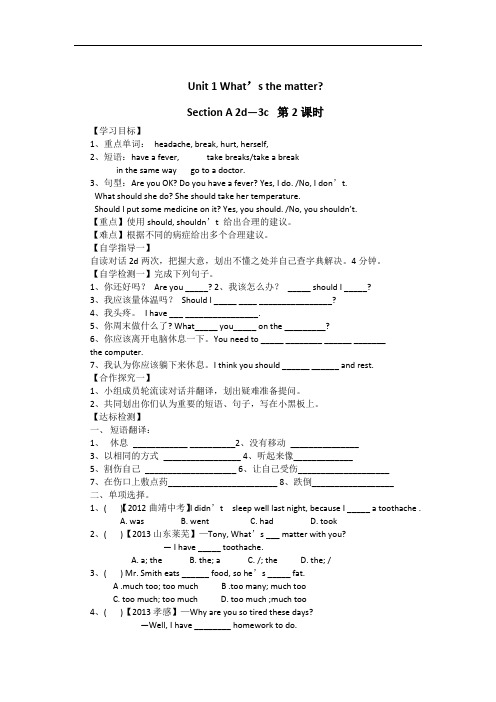
Unit 1 What’s the matter?Section A 2d—3c 第2课时【学习目标】1、重点单词:headache, break, hurt, herself,2、短语:have a fever, take breaks/take a breakin the same way go to a doctor.3、句型:Are you OK? Do you have a fever? Yes, I do. /No, I don’t.What should she do? She should take her temperature.Should I put some medicine on it? Yes, you should. /No, you shouldn’t.【重点】使用should, shouldn’t 给出合理的建议。
【难点】根据不同的病症给出多个合理建议。
【自学指导一】自读对话2d两次,把握大意,划出不懂之处并自己查字典解决。
4分钟。
【自学检测一】完成下列句子。
1、你还好吗?Are you _____?2、我该怎么办?_____ should I _____?3、我应该量体温吗?Should I _____ ____ ________________?4、我头疼。
I have ___ ________________.5、你周末做什么了? What_____ you_____ on the _________?6、你应该离开电脑休息一下。
You need to _____ ________ ______ _______the computer.7、我认为你应该躺下来休息。
I think you should ______ ______ and rest.【合作探究一】1、小组成员轮流读对话并翻译,划出疑难准备提问。
2、共同划出你们认为重要的短语、句子,写在小黑板上。
八年级英语下导学案(全)

【课题】Unit1 section A ( 1课时)【学习目标】学会用将来时态预言。
【重点、难点】1.will 构成的一般将来时态的陈述句、否定句、疑问句及回答。
2. There be 句型的一般将来时。
【导学指导】温故知新小组讨论设想未来世界的变化。
运用be going to谈论将来的计划和打算。
自主互助学习知识剖析:一般将来时态构成: will / be going to +动词原形1.用be going to do表示将来:主要意义,一是表示“意图”,即打算在最近的将来或将来进行某事。
Are you going to post that letter? I am going to book a ticket.另一意义是表示“预见”,即现在已有迹象表明将要发生或即将发生某种情况。
It’s going to rain.2.用will/ shall do表示将来:You will feel better after taking this medicine. 助动词will+动词原形I will not lend the book to you. 变否定句直接在will后加notYes,she will/ No.she won’t .3. fewer 与less及more表数量的用法。
1)few(形容词)“几乎没有,很少的”,修饰可数名词。
其比较级、最高级为规则变化:few-fewer-fewest“a few”表示“一些”“few”带否定含义,“几乎没有”。
2)little(形容词)“很少的,几乎没有的”(“小的,幼小的”),修饰不可数名词。
其比较级、最高级为不规则变化:little-less-least。
例:There will be less pollution.“a little”表“一些”,“little”带否定含义,“几乎没有”。
3)many“许多”,修饰可数名词。
much“许多”,修饰不可数名词。
人教新目标初中英语八年级下册Unit10_SectionA(3a-4c)精品导学案

Unit10 SectionA(3a-4c)精品导学案【Free talk】Talk about a yard sale in your group.【学习目标】1. 学习下列单词:railway, certain, honest, truthful, camera, hometown2. 学习下列短语:no longer, to be honest, grow up, clear out, give up, as for, some time, even though,3. 能熟练掌握下列语句:1. As they get bigger our house seems to get smaller.2. We have decided to each sell five things that we no longer use.3. He played with it almost every week until he was about seven.4. My daughter was more understanding, although she also felt sad to part with certain toys.4. 重点语法:现在完成时【导学案】一、通读课本3a-4c, 翻译下列短语:1. no longer____________2.to be honest___________3.grow up___________4. clear out______________5. give up______________6. as for_________7. some time_____________ 8. even though__________ 9.at first ___________10. part with ____________ 11. To be honest _________ 12. For a while____________ 13. raise money__________14. over there ___________ 15. One of the 最高级+名词复数二、词汇1. big(比较级)___________2.seem(单三) ___________3. Child(复数) ___________4.lose(过去式) ___________5.feel(过去式) ___________6.sleep(过去式)___________7.get(现在分词) ___________8. old(比较级)________9.build(名词)___________ 【课中案】一、自主学习1.首字母填空1) How long has his son o__________ the train and railway set?2) I have a c________ to take photos.3) We bought the piano from the Li family when they m_________ to the US last year.4) This museum is one of the oldest b__________ in this small town.2. 用所给词的适当形式填空1)He ___________(own) a train and railway set since his _______(four) birthday.2) He __________(sleep) next to the monkey every night when he was a child.3) I must ask him to give up ________(smoke)4) I ________ (never be) to Beijing before.5) Have you _________(think) about ________ (have) a yard sale________(sell) your things.6)I hope _________(visit) the place next year.二、合作探究,质疑解惑(小组讨论以下知识点,并分别造句运用)1. no longer=not…any longer no more = not … any longer2. although 与but3. not …until4. 最…之一.句式构成be one of the +形容词最高级+名词复数。
2018-2019学年人教新目标版八年级英语下册全册教案
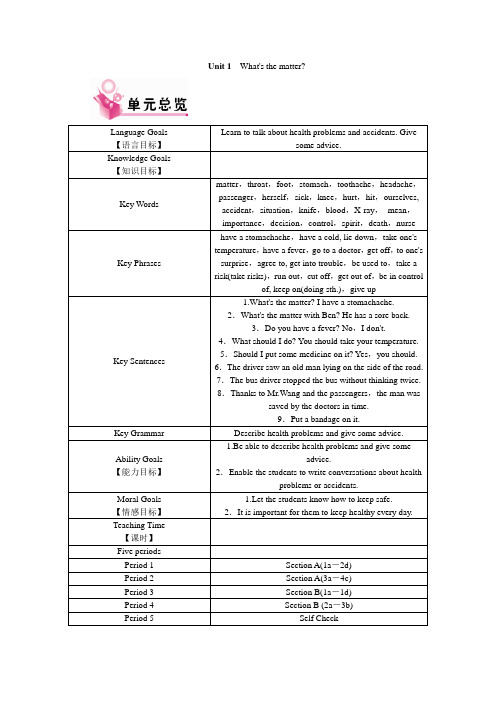
Unit 1What's the matter?Language Goals 【语言目标】Learn to talk about health problems and accidents. Givesome advice.Knowledge Goals 【知识目标】Key Words matter,throat,foot,stomach,toothache,headache,passenger,herself,sick,knee,hurt,hit,ourselves, accident,situation,knife,blood,X-ray,mean,importance,decision,control,spirit,death,nurseKey Phraseshave a stomachache,have a cold, lie down,take one's temperature,have a fever,go to a doctor,get off,to one's surprise,agree to, get into trouble,be used to,take a risk(take risks),run out,cut off,get out of,be in control of, keep on(doing sth.),give upKey Sentences1.What's the matter? I have a stomachache.2.What's the matter with Ben? He has a sore back.3.Do you have a fever? No,I don't. 4.What should I do? You should take your temperature. 5.Should I put some medicine on it? Yes,you should. 6.The driver saw an old man lying on the side of the road. 7.The bus driver stopped the bus without thinking twice. 8.Thanks to Mr.Wang and the passengers,the man wassaved by the doctors in time.9.Put a bandage on it.Key Grammar Describe health problems and give some advice.Ability Goals 【能力目标】1.Be able to describe health problems and give someadvice.2.Enable the students to write conversations about healthproblems or accidents.Moral Goals 【情感目标】1.Let the students know how to keep safe. 2.It is important for them to keep healthy every day.Teaching Time【课时】Five periodsPeriod 1 Section A(1a-2d) Period 2 Section A(3a-4c) Period 3 Section B(1a-1d) Period 4 Section B (2a-3b) Period 5 Self Check本单元教材以“What's the matter?”为中心话题,围绕着询问及描述“身体状况”进行学习和运用几个常见的句型:What's the matter? I have a stomachache./What's the matter with Ben? He has a sore back./Do you have a fever?No,I don't./What should I do? You should take your temperature./ Should I put some medicine on it? Yes,you should.等。
最新人教版八年级英语下册导学案(全册 共10个单元)
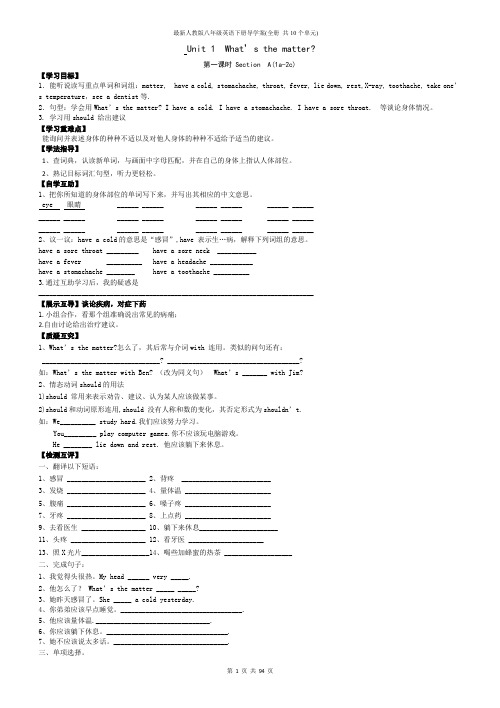
Unit 1 What’s the matter?第一课时 Section A(1a-2c)【学习目标】1.能听说读写重点单词和词组:matter, have a cold, stomachache, throat, fever, lie down, rest,X-ray, toothache, take one’s temperature,see a dentist等.2.句型:学会用What’s the matter? I have a cold. I have a stomachache. I have a sore throat. 等谈论身体情况。
3. 学习用should 给出建议【学习重难点】能询问并表述身体的种种不适以及对他人身体的种种不适给予适当的建议。
【学法指导】1、查词典,认读新单词,与画面中字母匹配,并在自己的身体上指认人体部位。
2、熟记目标词汇句型,听力更轻松。
【自学互助】1、把你所知道的身体部位的单词写下来,并写出其相应的中文意思。
eye 眼睛 ______ ______ ______ ______ ______ ____________ ______ ______ ______ ______ ______ ______ ____________ ______ ______ ______ ______ ______ ______ ______2、议一议:have a cold的意思是“感冒”,have 表示生…病,解释下列词组的意思。
have a sore throat _________ have a sore neck ___________have a fever __________ have a headache ____________have a stomachache ________ have a toothache __________3.通过互助学习后,我的疑惑是_____________________________________________________________________________【展示互导】谈论疾病,对症下药1.小组合作,看那个组准确说出常见的病痛;2.自由讨论给出治疗建议。
新版人教版新目标 八年级下册英语初二第二学期全册导学案
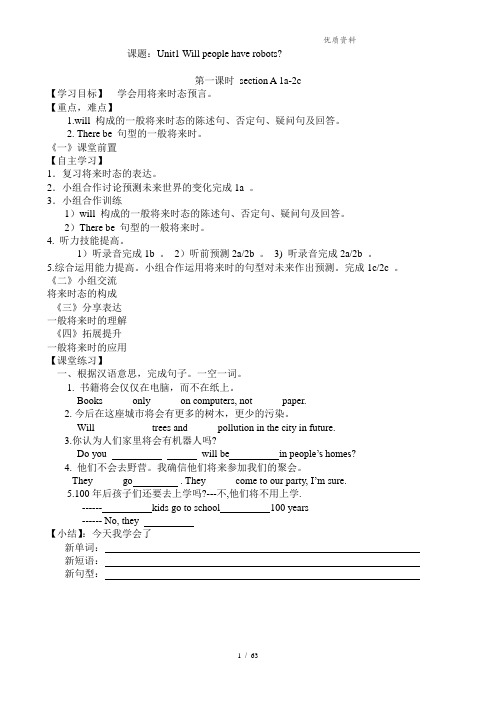
课题:Unit1 Will people have robots?第一课时section A 1a-2c【学习目标】学会用将来时态预言。
【重点,难点】1.will 构成的一般将来时态的陈述句、否定句、疑问句及回答。
2. There be 句型的一般将来时。
《一》课堂前置【自主学习】1.复习将来时态的表达。
2.小组合作讨论预测未来世界的变化完成1a 。
3.小组合作训练1)will 构成的一般将来时态的陈述句、否定句、疑问句及回答。
2)There be 句型的一般将来时。
4. 听力技能提高。
1)听录音完成1b 。
2)听前预测2a/2b 。
3) 听录音完成2a/2b 。
5.综合运用能力提高。
小组合作运用将来时的句型对未来作出预测。
完成1c/2c 。
《二》小组交流将来时态的构成《三》分享表达一般将来时的理解《四》拓展提升一般将来时的应用【课堂练习】一、根据汉语意思,完成句子。
一空一词。
1. 书籍将会仅仅在电脑,而不在纸上。
Books _____ only _____ on computers, not _____ paper.2. 今后在这座城市将会有更多的树木,更少的污染。
Will _____ _____ trees and _____ pollution in the city in future.3.你认为人们家里将会有机器人吗?Do you will be in people’s homes?4. 他们不会去野营。
我确信他们将来参加我们的聚会。
They _____ go . They _____ come to our party, I’m sure.5.100年后孩子们还要去上学吗?---不,他们将不用上学.------ kids go to school 100 years------ No, they【小结】:今天我学会了新单词:新短语:新句型:第二课时section A 3a-4【学习目标】1.理解并会用句型what do you think …will be in 10 years?预测未来。
人教版新目标初中八年级英语下册导学案全册
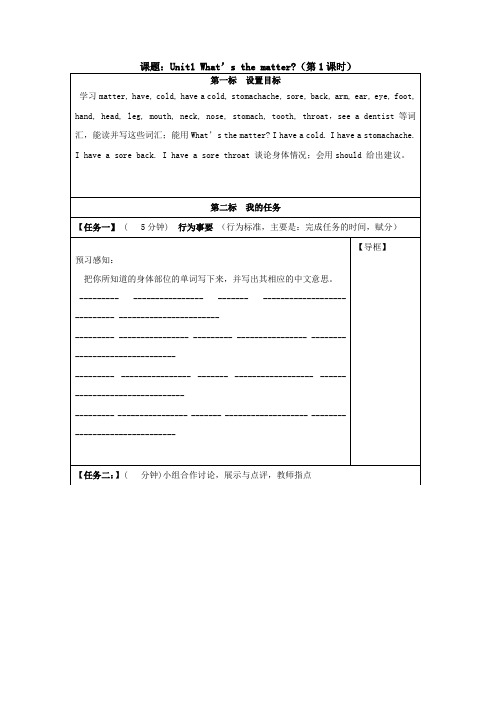
课题:Unit1 What’s the matter?(第2课时)课题:Unit1 What’s the matter?(第3课时)课题:Unit1 What’s the matter?(第4课时)课题:Unit1 What’s the matter?(第5课时)课题:Unit2 I’ll help to clean the city parks?(第1课时)课题:Unit2 I’ll help to clean the city parks?(第2课时)课题:Unit2 I’ll help to clean the city parks?(第3课时)课题:Unit2 I’ll help to clean the city parks?(第4课时)课题:Unit2 I’ll help to clean the city parks?(第5课时)课题:Unit3 Could you please clean your room?(第1课时)课题:Unit3 Could you please clean your room?(第2课时)课题:Unit3 Could you please clean your room?(第3课时)课题:Unit3 Could you please clean your room?(第4课时)课题:Unit3 Could you please clean your room?(第5课时)课题:Unit4 Why don’t you talk to your parents?(第1课时)课题:Unit4 Why don’t you talk to your parents?(第2课时)课题:Unit4 Why don’t you talk to your parents?(第3课时)。
新人教版英语八年级下册全册精美导学案(共计101页)

Unit 1 What’s the matter?Section A 1a-2c 第1课时【学习目标】1.能听说读写重点单词和词组:matter, sore, have a cold, stomachache, have a stomachache, foot, neck, stomach, throat, fever, lie, lie down, rest, cough, X-ray, toothache, take one’s temperature,see a dentist2.句型:学会用What’s the matter? I have a cold. I have a stomachache. I have a sore back. I have a sore throat. 谈论身体情况。
3. 学习用should 给出建议【重点】【难点】能询问并表述身体的种种不适以及对他人身体的种种不适给予适当的建议。
【自学指导】1、自己认读1a单词,与画面中字母匹配,并在自己的身体上指认人体部位。
2、对照单词表翻译1a 画面上的句子,并读熟。
5min (5分钟)【自学检测】1、把你所知道的身体部位的单词写下来,并写出其相应的中文意思。
__eye_ __眼睛_ ______ ______ ______ ______ ______ ____________ ______ ______ ______ ______ ______ ______ ____________ ______ ______ ______ ______ ______ ______ ____________ ______ ______ ______ ______ ______ ______ ______2、have a cold的意思是“感冒,着凉”为固定词组,have 表示生…病,解释下列词组的意思。
have a sore throat _________ have a sore neck ___________have a fever ____________ have a headache ____________have a stomachache ________ have a toothache __________【合作探究】1、What’s the mat ter?怎么了,其后常与介词with 连用。
人教版八年级下学期英语全册导学案(155页)

人教版八年级下学期英语全册导学案Unit 1 Where is your pen pal from?导学案1 Section A 1a--Grammar focus【学习目标】1.学会一些国家和城市的英文名称,:会用所学知识,询问和回答人们来自哪里。
2.学会理解和尊重异国文化.【学法指导】1、联系生活学习英语。
敢于用英语表达,用英语进行交际。
2、听力策略:A. 放松心情。
B. 注意关键字【课前准备】准备一张世界地图.【学习过程】一、预习指导与检测(一)预习指导1.预习第1-2页的生词,根据音标会读知意.2.朗读第1-2页的句型,能英汉互译.3.知识点拨:1)Where is/are + 主语 + from ?这一特殊疑问句用来询问某人来自哪里,回答时,用主语+is/are +from+地点。
eg:Where are you from? I’m from Chaohu. Where is he from? He’sfromHefei.拓展:be from = come from be是系动词,come 是实义动词eg: Where does he come from? He comes from Hefei.2)live 不及物动词,意思是“居住”不能直接加地点,需要有介词.eg: ----- Where does she live? ------She lives in Paris.3)pen pal =pen friend 笔友4)China 中国 Chinese 中国人 Japan 日本 Japanese 日本人eg:We are all Chinese. The three girl are Australians. (二)预习检测1.你知道这些国家和地区的英文名称吗?(1)中国_______(2) 加拿大________ (3)法国________(4)英国_________(5)澳大利亚______(6) 美国_______(7)新加坡______ (8)悉尼________(9) 巴黎_______(10)纽约________(11)多伦多_______(12)东京_________二、课堂互动探究1. 小组活动:1) 共同总结本节课的重点单词及短语,然后互相提问。
最新人教版新目标初二八年级英语下册全套导学案(可编辑)名师优秀教案
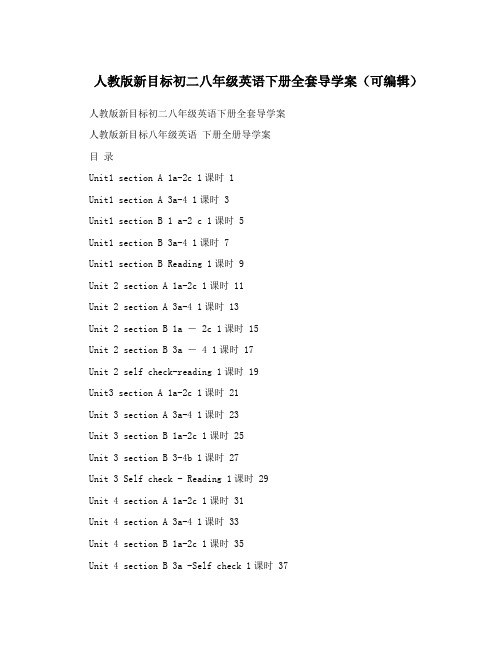
人教版新目标初二八年级英语下册全套导学案(可编辑)人教版新目标初二八年级英语下册全套导学案人教版新目标八年级英语下册全册导学案目录Unit1 section A 1a-2c 1课时 1Unit1 section A 3a-4 1课时 3Unit1 section B 1 a-2 c 1课时 5Unit1 section B 3a-4 1课时 7Unit1 section B Reading 1课时 9Unit 2 section A 1a-2c 1课时 11Unit 2 section A 3a-4 1课时 13Unit 2 section B 1a ― 2c 1课时 15Unit 2 section B 3a ― 4 1课时 17Unit 2 self check-reading 1课时 19Unit3 section A 1a-2c 1课时 21Unit 3 section A 3a-4 1课时 23Unit 3 section B 1a-2c 1课时 25Unit 3 section B 3-4b 1课时 27Unit 3 Self check - Reading 1课时 29Unit 4 section A 1a-2c 1课时 31Unit 4 section A 3a-4 1课时 33Unit 4 section B 1a-2c 1课时 35Unit 4 section B 3a -Self check 1课时 37Unit 4 Reading 1课时 39Unit 5 section A 1a-2c 1课时 41Unit 5 section A 3a-4 1课时 43Unit 5 section B 1a-2c 1课时 45Unit 5 section B 3a -Self check 2课时 47 Unit 6 section A 1a-2c 1课时 49Unit 6 section A 3a-4 1课时 51Unit 6 section B 1a-2c 1课时 53Unit 6 section B 3a -Self check 2课时 55 Unit 6 Reading 1课时 57Unit7 Section A 1a-2c 1课时 59Unit7 Section A 3a-4 1课时 61Unit7 Section B 1a -2c 1课时 63Unit7 Section B 3a -4 1课时 65Unit7 Reading 1课时 67Unit8 Section A 1a -2c 1课时 69Unit8 Section A 3a-4 1课时 71Unit8 Section B 1a -2c 1课时 73Unit8 Section B 3a -4 1课时 75Unit8 Reading 1课时 78Unit9 Section A 1a-2c 1课时 80Unit9 Section A 3a -4 1课时 82Unit9 Section B 1a-2c 1课时 84Unit9 Section B 3a-4 1课时 86Unit9 Reading 1课时 88Unit 10 Section A 1a-2c 1课时 90Unit10 Section A 3a -4 1课时 92Unit1 0 Section B 1a-2c 1课时 94Unit 10 Section B 3a-4 1课时 96Unit1 0 Self check 1课时 98八年级英语下册导学案will 构成的一般将来时态的陈述句、否定句、疑问句及回答。
- 1、下载文档前请自行甄别文档内容的完整性,平台不提供额外的编辑、内容补充、找答案等附加服务。
- 2、"仅部分预览"的文档,不可在线预览部分如存在完整性等问题,可反馈申请退款(可完整预览的文档不适用该条件!)。
- 3、如文档侵犯您的权益,请联系客服反馈,我们会尽快为您处理(人工客服工作时间:9:00-18:30)。
Unit 1 What’s the matter?Section A 1a-2c 第1课时【学习目标】1.能听说读写重点单词和词组:matter, sore, have a cold, stomachache, have a stomachache, foot, neck, stomach, throat, fever, lie, lie down, rest, cough, X-ray, toothache, take one’s temperature,see a dentist2.句型:学会用What’s the matter? I have a cold. I have a stomachache. I have a sore back. I have a sore throat. 谈论身体情况。
3. 学习用should 给出建议【重点】【难点】能询问并表述身体的种种不适以及对他人身体的种种不适给予适当的建议。
【自学指导】1、自己认读1a单词,与画面中字母匹配,并在自己的身体上指认人体部位。
2、对照单词表翻译1a画面上的句子,并读熟。
5min (5分钟)【自学检测】1、把你所知道的身体部位的单词写下来,并写出其相应的中文意思。
__eye_ __眼睛_ ______ ______ ______ ______ ______ ____________ ______ ______ ______ ______ ______ ______ ____________ ______ ______ ______ ______ ______ ______ ____________ ______ ______ ______ ______ ______ ______ ______2、have a cold的意思是“感冒,着凉”为固定词组,have 表示生…病,解释下列词组的意思。
have a sore throat _________ have a sore neck ___________have a fever ____________ have a headache ____________have a stomachache ________ have a toothache __________【合作探究】1、What’s the matter?怎么了,其后常与介词with 连用。
类似的问句还有:_________________________ _________________________What’s the matter with Ben? (改为同义句)What’s _______ with Jim?2、情态动词should的用法1)should 常用来表示劝告、建议、认为某人应该做某事。
2)should 本身不能单独作谓语,必须和动词原形连用。
should 没有人称和数的变化,其否定形式为shouldn’t.如:We__________ study hard.我们应该努力学习。
You_________ play computer games.你不应该玩电脑游戏。
He ________ lie down and rest. 他应该躺下来休息。
【达标检测】一、翻译以下短语:1、感冒______________________2、背疼_________________________3、发烧______________________4、量体温________________________5、腹痛______________________6、嗓子疼________________________7、牙疼______________________ 8、上点药________________________9、去看医生______________________ ___________________________10、躺下来休息______________________ 11、头疼_____________________ 12、看牙医_____________________ 13、照X光片____________________14、喝些加蜂蜜的热茶________________________二、完成句子:1、你怎么了?What’s the matter _____ you?2、他怎么了?What’s the matter _____ _____?3、她昨天感冒了。
She _____ a cold yesterday.4、Mary咳嗽。
Mary ______.5、我觉得头很热。
My head ______ very _____.6、你应该回家休息。
__________________________________.7、她不应该说太多话。
________________________________.8、你弟弟应该早点睡觉。
__________________________________.9、--他应该量体温吗?_________________________________?--是的。
_____,____________.10、你看起来不太好。
_____________________.三、单项选择。
( )①What’s ____ with you?A. troubleB. the matterC. the wrongD. matter( )②—______?— Nothing serious, but a bit tired.—Better have a rest now, dear.A. Is that allB. Is there anything elseC. What’s thisD. What’s the matter with you( )③【2013湖北孝感】—_________?—I have a headache and I don’t feel like eating anything.A. How are youB. What can I do for youC. What’s the matter with youD. How do you like it( )④【2011.云南昆明】27. —What’s the matter with Tina?—_______________.A. She is away.B. She is cool.C. She has a sore throat.D. She should take some medicine【总结反思】__________________________________________________________________________________________________________________【课后作业】1、熟练说出本课重点短语和重点句型,并一次。
2、根据2a、2b 编5组对话,并和同桌练熟。
(教师复备栏及学生笔记)Unit 1 What’s the matter?Section A 2d—3c 第2课时【学习目标】1、重点单词:headache, break, hurt, herself,2、短语:have a fever, take breaks/take a breakin the same way go to a doctor.3、句型:Are you OK? Do you have a fever? Yes, I do. /No, I don’t.What should she do? She should take her temperature.Should I put some medicine on it? Yes, you should. /No, you shouldn’t.【重点】使用should, shouldn’t 给出合理的建议。
【难点】根据不同的病症给出多个合理建议。
【自学指导一】自读对话2d两次,把握大意,划出不懂之处并自己查字典解决。
4分钟。
【自学检测一】完成下列句子。
1、你还好吗?Are you _____?2、我该怎么办?_____ should I _____?3、我应该量体温吗?Should I _____ ____ ________________?4、我头疼。
I have ___ ________________.5、你周末做什么了? What_____ you_____ on the _________?6、你应该离开电脑休息一下。
You need to _____ ________ ______ _______the computer.7、我认为你应该躺下来休息。
I think you should ______ ______ and rest.【合作探究一】1、小组成员轮流读对话并翻译,划出疑难准备提问。
2、共同划出你们认为重要的短语、句子,写在小黑板上。
【达标检测】一、短语翻译:1、休息____________ __________2、没有移动_______________3、以相同的方式_________________4、听起来像_____________5、割伤自己____________________6、让自己受伤____________________7、在伤口上敷点药________________________ 8、跌倒__________________二、单项选择。
1、( )【2012曲靖中考】I didn’t sleep well last night, because I _____ a toothache .A. wasB. wentC. hadD. took2、( )【2013山东莱芜】—Tony, What’s ___ matter with you?— I have _____ toothache.A. a; theB. the; aC. /; theD. the; /3、( ) Mr. Smith eats ______ food, so he’s _____ fat.A .much too; too muchB .too many; much tooC. too much; too muchD. too much ;much too4、( )【2013孝感】—Why are you so tired these days?—Well, I have ________ homework to do.A. too muchB. too many C . much too D. many too5、( ) You ____ be quiet when you are in the reading room.A. shouldB. shouldn’tC. canD. can’t6、( )【2013安徽】You _____ drive your car so fast. It’s very dangerous.A. wouldn’tB. shouldn’tC. couldn’tD. mightn’t7、( ) David needs ______ a good rest.A. hasB. to haveC. have8、( )【2013连云港】30. —I'd like a cup of black coffee. What about you, Maggie? —I prefer coffee ________ sugar.A. thanB. forC. withD. to9、( ) The boy isn’t ___ to dress himself.A. old enoughB. enough oldC. old10、( ) —I’m sorry to break your pen. —_______A. That’s rightB. It doesn’t matterC. Thank you【总结反思】__________________________________________________________________________________________________________________【课后作业】1、完成导学方案Unit 1 A部分。
